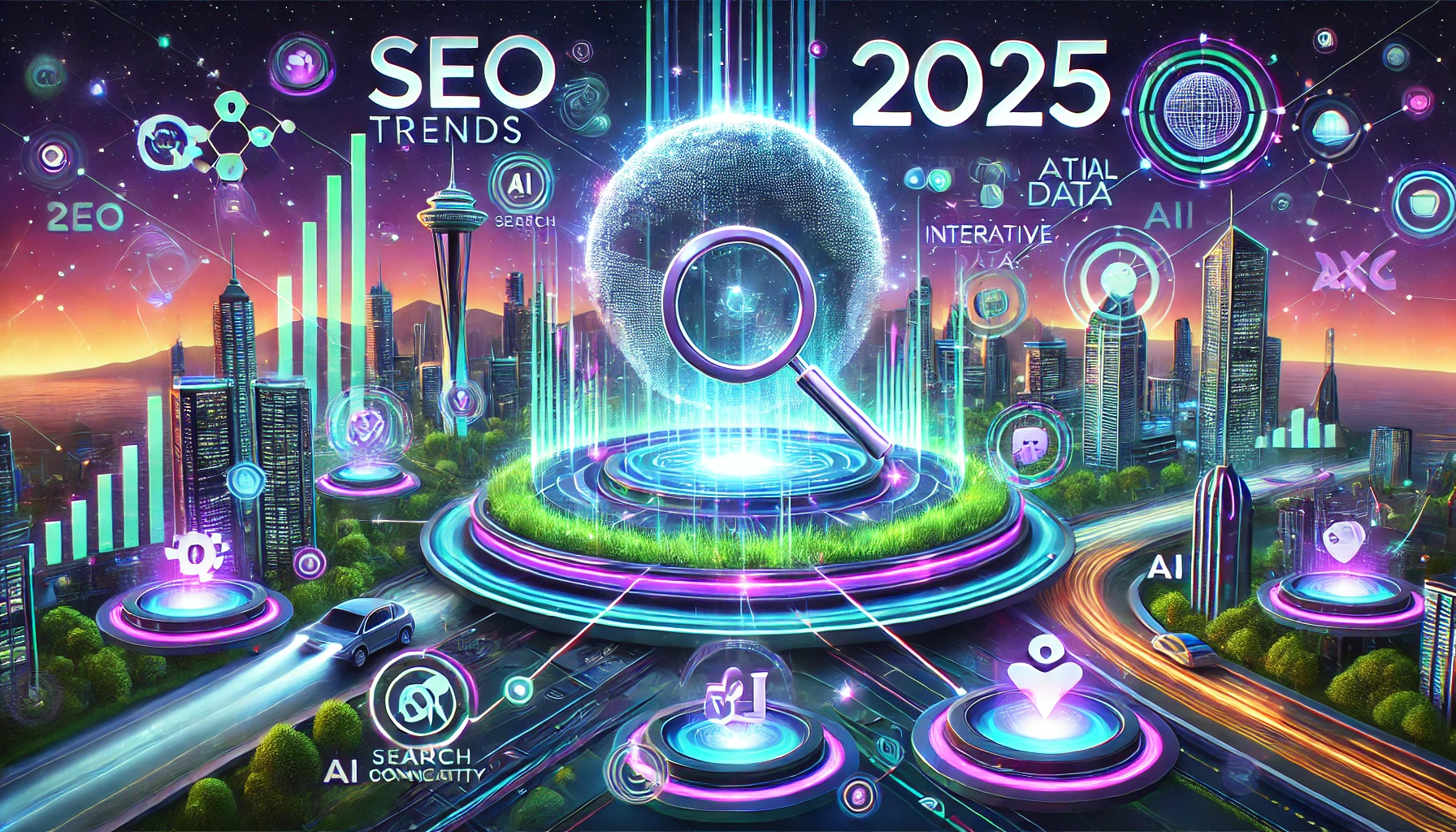As we approach 2025, the search engine optimization landscape continues to undergo dramatic transformations. With the rapid advancement of artificial intelligence, evolving user behaviors, and increasingly sophisticated search algorithms, staying ahead of SEO trends has never been more crucial. This comprehensive guide explores the most significant developments that will shape SEO strategy in 2025 and beyond.
1. AI-First Search Experience: The New Normal
The integration of artificial intelligence in search has fundamentally altered how search engines understand and rank content. According to Search Engine Journal’s recent analysis, AI-powered search algorithms now process user intent with unprecedented accuracy.
Semantic Search Evolution
- Advanced natural language processing enables search engines to understand context, emotion, and nuance at near-human levels
- Traditional keyword optimization gives way to topic clustering and semantic relevance
- Google’s MUM update demonstrates the ability to understand complex queries across multiple languages and formats
AI Content Detection and Quality Assessment
- Search engines employ sophisticated AI detection systems to evaluate content authenticity
- High-quality AI-assisted content remains acceptable when properly disclosed and enhanced with unique insights
- Content quality signals now include:
- Originality metrics
- Information density
- Expert validation
- Source credibility
According to a recent Moz study, websites that balance AI efficiency with human expertise see 47% higher engagement rates.
2. Voice and Visual Search: The Multi-Modal Future
The convergence of voice and visual search technologies is reshaping how users interact with search engines. Statista reports that by 2025, over 75% of U.S. households will own smart speakers, making voice search optimization essential.
Voice Search Optimization Strategies
- Conversational keyword optimization
- Featured snippet targeting
- Local SEO enhancement for voice queries
- FAQ schema implementation
Visual Search Integration
- Advanced image optimization requirements
- Product visualization best practices
- AR/VR content optimization
- Visual search markup implementation
Read more about SEO Statistics for 2024
3. Core Web Vitals 2.0: The UX Revolution
Google’s commitment to user experience has evolved into an even more sophisticated set of metrics. The Chrome Developer Blog highlights several new performance indicators:
Advanced Performance Metrics
- Sub-second loading time requirements
- Interaction to Next Paint (INP) optimization
- Mobile-first indexing evolution
- Real-time performance monitoring
According to Web.dev, websites meeting all Core Web Vitals thresholds see:
- 24% lower bounce rates
- 35% higher conversion rates
- 18% increase in organic traffic
Enhanced Engagement Signals
- Time-to-first-interaction importance
- Sophisticated bounce rate interpretation
- User journey mapping influence
- Interaction quality assessment
4. E-E-A-T 2.0: Trust and Authority Redefined
Experience, Expertise, Authoritativeness, and Trustworthiness now incorporate new dimensions, as outlined in Google’s Quality Rater Guidelines.
Enhanced Author Validation
- Digital identity verification systems
- Author expertise scoring mechanisms
- Real-world credentials verification
- Publication history analysis
Trust Signals Evolution
- Blockchain-verified content authenticity
- Third-party validation integration
- Enhanced fact-checking requirements
- Source citation quality assessment
5. Technical SEO Trends: The Foundation Strengthens
Technical optimization requirements have become more sophisticated, with new emerging standards highlighted by Technical SEO Guide.
Advanced Schema Markup
- Industry-specific schema types
- Dynamic schema requirements
- Real-time schema updates
- Enhanced product markup
Security and Privacy Optimization
- Zero-party data collection
- Enhanced HTTPS requirements
- Privacy-first indexing
- User data protection compliance
6. Local SEO Trends: Hyperlocal Targeting Takes Center Stage
Local search continues to evolve with new technologies and user expectations. BrightLocal’s Local Consumer Review Survey reveals that 95% of consumers use local search at least monthly.
Hyperlocal Targeting Strategies
- Neighborhood-level optimization
- Real-time inventory integration
- Local service area targeting
- Community engagement signals
Virtual Location Experiences
- Virtual tour optimization
- AR-enhanced business listings
- Interactive local content
- Location-based user experience
7. Content Format Evolution: Beyond Text
Content optimization now requires multiple format considerations, as highlighted by Content Marketing Institute.
Multi-Format Optimization
- Video-first indexing requirements
- Podcast content optimization
- Interactive content integration
- Social media content alignment
Adaptive Content Delivery
- Device-specific content versions
- Context-aware adaptation
- Dynamic content assembly
- Cross-platform optimization
8. Social Search Integration
Social media platforms increasingly function as search engines, requiring new optimization approaches. Social Media Today reports that 54% of Gen Z users prefer social media for product discovery.
Social Search Optimization
- Platform-specific keyword strategies
- Visual content optimization
- Hashtag strategy evolution
- Cross-platform content alignment
Social Signals Integration
- Social engagement metrics
- Brand mention monitoring
- Influencer collaboration signals
- Social proof integration
9. Mobile-First Becomes Mobile-Only
With Statista projecting mobile devices to account for 77% of internet traffic by 2025, mobile optimization becomes paramount.
Mobile Optimization Requirements
- Progressive Web App implementation
- Mobile-first content design
- Touch-interaction optimization
- Mobile payment integration
Mobile Performance Metrics
- Mobile loading speed requirements
- Mobile interaction patterns
- App-like experience expectations
- Mobile-specific ranking factors
Actionable Implementation Strategy for 2025 Based On SEO Trends
- Conduct a Comprehensive Audit
- Technical SEO assessment
- Content quality evaluation
- Mobile optimization review
- User experience analysis
- Develop an AI Strategy
- Implement AI content guidelines
- Establish AI disclosure policies
- Balance automation and human expertise
- Monitor AI content performance
- Optimize for Multiple Search Modes
- Voice search optimization
- Visual search implementation
- Social search integration
- Local search enhancement
- Enhance User Experience
- Core Web Vitals optimization
- Mobile experience improvement
- Page speed optimization
- Interaction quality enhancement
- Build Trust and Authority
- Author expertise documentation
- Content verification systems
- Source citation improvement
- Trust signal implementation
Future Considerations and Challenges
As we move through 2025, several challenges and opportunities will emerge:
Privacy and Data Protection
- Enhanced user privacy requirements
- First-party data optimization
- Cookie-less tracking solutions
- Privacy-compliant analytics
AI Integration Balance
- Human-AI content collaboration
- AI disclosure requirements
- Quality control mechanisms
- Performance monitoring systems
Technical Evolution
- New ranking factor adaptation
- Algorithm update responses
- Technology stack updates
- Performance optimization
Conclusion
SEO in 2025 requires a sophisticated, multi-faceted approach that balances technical excellence with authentic human value. Success depends on embracing new technologies while maintaining focus on delivering genuine user value. Organizations that adapt to these trends while maintaining high standards for content quality and user experience will see the best results in their search optimization efforts.
The key to success lies in staying agile and maintaining a balanced approach:
- Embrace AI while preserving human expertise
- Optimize for multiple search modes
- Focus on user experience and technical excellence
- Build genuine authority and trust
- Maintain privacy and security standards
As search engines continue to evolve, the most successful SEO strategies will be those that can quickly adapt to new developments while maintaining a strong foundation in proven optimization principles.
Remember to regularly consult authoritative sources like Google Search Central, Moz, and Search Engine Journal for the latest updates and best practices in SEO.




